英国文学名词解释
(完整版)英国文学名词解释
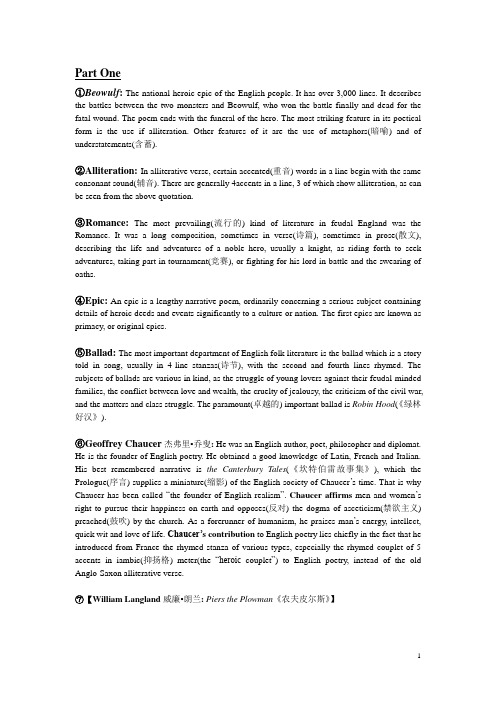
①Beowulf: The national heroic epic of the English people. It has over 3,000 lines. It describes the battles between the two monsters and Beowulf, who won the battle finally and dead for the fatal wound. The poem ends with the funeral of the hero. The most striking feature in its poetical form is the use if alliteration. Other features of it are the use of metaphors(暗喻) and of understatements(含蓄).②Alliteration: In alliterative verse, certain accented(重音) words in a line begin with the same consonant sound(辅音). There are generally 4accents in a line, 3 of which show alliteration, as can be seen from the above quotation.③Romance:The most prevailing(流行的) kind of literature in feudal England was the Romance. It was a long composition, sometimes in verse(诗篇), sometimes in prose(散文), describing the life and adventures of a noble hero, usually a knight, as riding forth to seek adventures, taking part in tournament(竞赛), or fighting for his lord in battle and the swearing of oaths.④Epic:An epic is a lengthy narrative poem, ordinarily concerning a serious subject containing details of heroic deeds and events significantly to a culture or nation. The first epics are known as primacy, or original epics.⑤Ballad: The most important department of English folk literature is the ballad which is a story told in song, usually in 4-line stanzas(诗节), with the second and fourth lines rhymed. The subjects of ballads are various in kind, as the struggle of young lovers against their feudal-minded families, the conflict between love and wealth, the cruelty of jealousy, the criticism of the civil war, and the matters and class struggle. The paramount(卓越的) important ballad is Robin Hood(《绿林好汉》).⑥Geoffrey Chaucer杰弗里▪乔叟: He was an English author, poet, philosopher and diplomat. He is the founder of English poetry. He obtained a good knowledge of Latin, French and Italian. His best remembered narrative is the Canterbury Tales(《坎特伯雷故事集》), which the Prologue(序言) supplies a miniature(缩影) of the English society of Chaucer’s time. That is why Chaucer has been called “the founder of English realism”. Chaucer affirms men and women’s right to pursue their happiness on earth and opposes(反对) the dogma of asceticism(禁欲主义) preached(鼓吹) by the church. As a forerunner of humanism, he praises man’s energy, intellect, quick wit and love of life. Chaucer’s contribution to English poetry lies chiefly in the fact that he introduced from France the rhymed stanza of various types, especially the rhymed couplet of 5 accents in iambic(抑扬格) meter(the “heroic couplet”) to English poetry, instead of the old Anglo-Saxon alliterative verse.⑦【William Langland威廉▪朗兰: Piers the Plowman《农夫皮尔斯》】The English Bible:The first complete English Bible was translated by John Wycliffe(约翰▪威克里夫). The Authorized Version is King James Bible made in 1611. The result is a monument of English language and English literature.Renaissance:Renaissance or the birth of letters is an intellectual movement. Its two features are a thirsting curiosity for the classical literature and the keen interest in the activities of humanity. Humanism is the key-note of the Renaissance.William Caxton威廉▪卡克斯顿: He is the first English printer and invented in England the profession of publisher.Thomas More托马斯▪莫尔:The greatest of the English humanists was Thomas More, the author of Utopia《乌托邦》. He is also one of such “giants”(巨匠) of the Renaissance. He distinguished himself as a learned scholar, a master of Latin, a witty talker, a lover of music, an honest statesman , and a man of noble character, modest but steadfast(坚定的), to his convictions. He was a far-sighted thinker, aspired for a totally new society with happy, classless, and free from poverty and exploitation. He was one of the forerunners of modern socialist thought.Utopia:It is More’s masterpiece, written in the form of a conservation between More and Hythloday, a returned voyager. It is divided into two books. The first book contains a long discussion on the social conditions of England. In the second book is described in detail an ideal communist society, Utopia. The name “Utopia” comes from Greek words meaning “no place” and was adopted by More as the name of his ideal commonwealth.Philip Sidney菲利普▪锡德尼: He is well-known as a poet and critic of poetry. His collection of love sonnets, Astrophel and Stella《爱星者与星》, was published in 1591.Edmund Spenser埃德蒙▪斯宾塞(莎翁之前最杰出的英国诗人):The poet’s poet of the period was ES who was buried beside Chaucer in Westminster Abbey. ES has held his position as a model of poetical art among the Renaissance English poets, and his influence can be traced in the works of Milton, Shelley, and Keats. ES is the first master to make that language the natural music of his poetic effusions(感情的流露). His sonnets in Amoretti, together with Sidney’s Astrophel and Stella and Shakespeare’s sonnets ,are the most famous sonnet sequences of the Elizabeth Age.【In 1579 he wrote The Shepherd’s Calendar《牧人日记》which marked the budding(萌芽) of the Renaissance flower in the northern island of England. The faerie Queen 《仙后》is his greatest work which was dedicated to Queen Elizabeth.】Francis Bacon: He is the founder of English materialist philosophy and the founder of modern science in England. His New Instrument is called the Inductive Method of reasoning. He is also the first English essayist. To give a few, “Men fear death as children fear to go in the dark..”“Studies serve for delight.”“Reading makes a full man; conference a ready man; and writing anexact man.”Drama: The Miracle Play圣迹剧The Morality Play道德剧寓意剧The Interlude幕间节目Christopher Marlowe克里斯托弗·马洛: The most gifted of the “university wits”was Christopher Marlowe. His best work include 3 of his plays, Tamburlaine《帖木儿大帝》(1587), The Jew of Malta《马耳岛的犹太人》(1592), and Doctor Faustus《浮士德博士》(1588). He was the greatest of the pioneers of English drama. His work paved the way for the plays of the greatest English dramatist——Shakespeare——whose achievements were the monument of the English Renaissance. 【His plays show the spirit of the rising bourgeoisie, its eager curiosity for knowledge, its towering pride, its insatiable(不知足的) appetite for power won by military, might, knowledge, or gold. The theme of his plays is the praise of individuality freed from the restraints of medieval dogmas and law, and the conviction of the boundless possibility of human efforts in conquering the universe. The heroes in his plays are merely individualists, their individualistic ambition often brings ruin to the world and sometimes to themselves.】William Shakespeare: Shakespeare is one of the founders of realism in world literature. His dramatic creation often used the method of adaptation. Shakespeare long experience with the stage and his intimate knowledge of dramatic art thus acquired make him a master hand for playwriting. Shakespeare was skilled in many poetic forms: the song, the sonnet, the couplet, and the dramatic blank verse. He was especially at home with the blank verse. Shakespeare was a great master of the English language. Shakespeare has been universally acknowledged to be the summit of the English Renaissance, and one of the greatest writers over the world.①The great comedies:A Midsummer Might’s Dream, The Merchant of Venice, As You Like It,Twelfth Night.②The great tragedies:Hamlet, Othello, King Lear, Macbeth.The Merchant of V enice:威尼斯富商安东尼奥Antonio为了成全好友巴萨尼奥Bassanio的婚事,向犹太人高利贷者夏洛克Shylock借债。
英国文学名词解释

民谣:民间流行的、富于民族色彩的歌曲,称为民谣或民歌。民谣的历史悠远,故其作者多不知名。民谣的内容丰富,有宗教的、爱情的、战争的、工作的,也有饮酒、舞蹈作乐、祭典等等。民谣既是表现一个民族的感情与习尚,因此各有其独特的音阶与情调风格。
(Folk songs:Civil popular, rich colors of the national songs, ballads or folk songs called. Youyuan the history of folk songs, the more its author unknown. The rich folk, religion, love, war, work, but also to drink, dance fun, festivals and so on. Performance of folk songs is not only a nation's feelings and still learning, so have their own unique scale and exotic style.)
历史诗:叙述英雄传说或重大历史事件的古代叙事长诗。多以古代英雄歌谣为基础,经集体编创而成,反映人类童年时期的具有重大意义的历史事件或者神话传说。它运用艺术虚构手法,塑造著名英雄形象,结构宏大,充满着幻想和神奇的色彩。(History of poetry: The Legend of Heroes or describes major historical events of ancient narrative shi. Most of the ancient heroes songs based on a provision from the collective, human childhood reflect the significant historical events or myths and legends. It means using the arts fiction, heroic image of well-known shape, structure ambitious, full of fantasy and magic of color.)
英国文学下名词解释
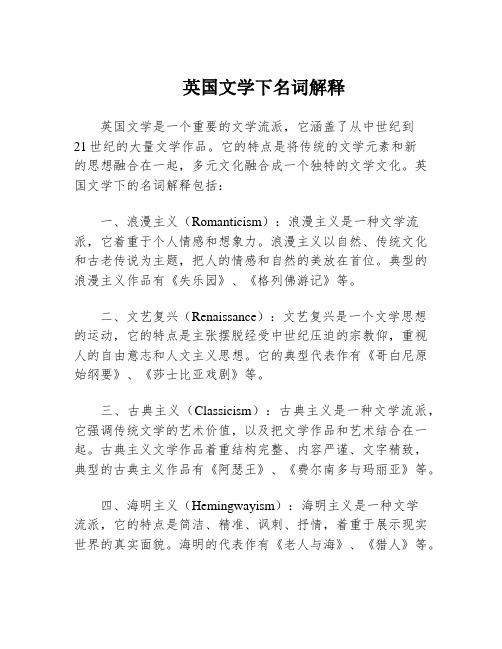
英国文学下名词解释英国文学是一个重要的文学流派,它涵盖了从中世纪到21世纪的大量文学作品。
它的特点是将传统的文学元素和新的思想融合在一起,多元文化融合成一个独特的文学文化。
英国文学下的名词解释包括:一、浪漫主义(Romanticism):浪漫主义是一种文学流派,它着重于个人情感和想象力。
浪漫主义以自然、传统文化和古老传说为主题,把人的情感和自然的美放在首位。
典型的浪漫主义作品有《失乐园》、《格列佛游记》等。
二、文艺复兴(Renaissance):文艺复兴是一个文学思想的运动,它的特点是主张摆脱经受中世纪压迫的宗教仰,重视人的自由意志和人文主义思想。
它的典型代表作有《哥白尼原始纲要》、《莎士比亚戏剧》等。
三、古典主义(Classicism):古典主义是一种文学流派,它强调传统文学的艺术价值,以及把文学作品和艺术结合在一起。
古典主义文学作品着重结构完整、内容严谨、文字精致,典型的古典主义作品有《阿瑟王》、《费尔南多与玛丽亚》等。
四、海明主义(Hemingwayism):海明主义是一种文学流派,它的特点是简洁、精准、讽刺、抒情,着重于展示现实世界的真实面貌。
海明的代表作有《老人与海》、《猎人》等。
英国文学的多样性反映了英国文化的发展和多元文化的融合,这种多样性使英国文学在世界文学史上占有重要地位。
浪漫主义、文艺复兴、古典主义和海明主义是英国文学发展史中重要的文学流派,它们都给英国文学提供了新的思想,使英国文学不断发展壮大。
浪漫主义以自然和传统文化为主题,着重于情感和想象力,是一种表现个人内心世界的文学流派。
文艺复兴是一个文学思想运动,它强调人文主义思想,重视自由意志和人的尊严。
古典主义是一种文学流派,它着重于文学作品的艺术价值,追求文学作品的结构完整性和文字精致性。
海明主义是一种文学流派,它以简洁、精准、讽刺、抒情为特点,展示现实生活的真实面貌。
英国文学的多样性和文学流派的多元化,使英国文学在世界文学史上独树一帜,成为一种独特的文学文化。
英国文学主要名词解释
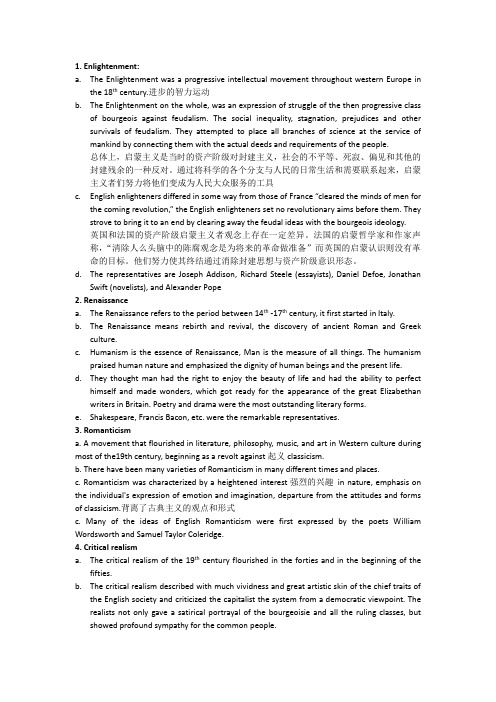
1. Enlightenment:a.The Enlightenment was a progressive intellectual movement throughout western Europe inthe 18th century.进步的智力运动b.The Enlightenment on the whole, was an expression of struggle of the then progressive classof bourgeois against feudalism. The social inequality, stagnation, prejudices and other survivals of feudalism. They attempted to place all branches of science at the service of mankind by connecting them with the actual deeds and requirements of the people.总体上,启蒙主义是当时的资产阶级对封建主义,社会的不平等、死寂、偏见和其他的封建残余的一种反对。
通过将科学的各个分支与人民的日常生活和需要联系起来,启蒙主义者们努力将他们变成为人民大众服务的工具c.English enlighteners differed in some way from those of France “cleared the minds of men forthe coming revolution,” the English enlighteners set no revolutionary aims before them. They strove to bring it to an end by clearing away the feudal ideas with the bourgeois ideology.英国和法国的资产阶级启蒙主义者观念上存在一定差异。
英国文学 名词解释

英国文学名词解释
英国文学是指英格兰、苏格兰、威尔士和北爱尔兰地区的文学作品。
它的历史可以追溯到中世纪,经历了文艺复兴时期、启蒙时代、浪漫主义时期、维多利亚时代等不同的文学风格和时期。
英国文学的特点之一是其丰富多样的文学形式。
从中世纪的骑士传奇和中世纪诗歌到现代小说和诗歌,英国文学涵盖了各种各样的文学体裁。
其中一些最重要的文学体裁包括史诗、戏剧、诗歌、小说和散文。
这些不同的文学形式为英国文学带来了不同的风格和主题。
英国文学的另一个重要特点是其丰富多样的主题和风格。
从中世纪的宗教作品和史诗到现代小说和诗歌,英国文学涵盖了各种各样的主题。
它反映了社会、政治、宗教和文化变革的演变。
一些最常见的主题包括爱情、战争、自然、宗教、社会道德和个人发展。
不同的作家和时代也采用了不同的文学风格和技巧来表达这些主题。
英国文学的另一个重要方面是它的历史和文化意义。
通过阅读英国文学作品,我们可以了解英国历史的演变,了解英国社会和文化的发展。
英国文学作品中经常出现的历史事件、人物和地点也成为了文学研究和文化遗产的重要组成部分。
在英国文学中,有很多重要的作家和作品。
莎士比亚、狄更斯、奥斯卡·王尔德、简·奥斯汀和弗吉尼亚·伍尔夫都是英国文学史上的重要人物。
他们的作品不仅在英国有着广泛的影响力,也
对世界文学产生了重要的影响。
总之,英国文学是一个丰富多样的文学传统,它的作品涵盖了各种各样的文学形式、主题和风格。
通过阅读和研究英国文学作品,我们可以深入了解英国的历史、文化和文学发展。
英国文学名词解释
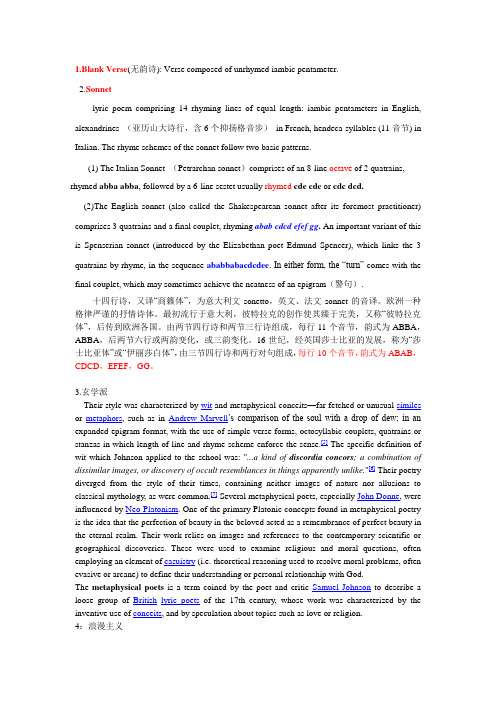
1.Blank Verse(无韵诗): Verse composed of unrhymed iambic pentameter.2.Sonnetlyric poem comprising 14 rhyming lines of equal length: iambic pentameters in English, alexandrines (亚历山大诗行,含6个抑扬格音步)in French, hendeca-syllables (11音节) in Italian. The rhyme schemes of the sonnet follow two basic patterns.(1) The Italian Sonnet (Petrarchan sonnet)comprises of an 8-line octave of 2 quatrains, rhymed abba abba, followed by a 6-line sestet usually rhymed cde cde or cdc dcd.(2)The English sonnet (also called the Shakespearean sonnet after its foremost practitioner) comprises 3 quatrains and a final couplet, rhyming abab cdcd efef gg. An important variant of this is Spenserian sonnet (introduced by the Elizabethan poet Edmund Spencer), which links the 3 quatrains by rhyme, in the sequence ababbabacdcdee. In either form, the “turn” comes with the final couplet, which may sometimes achieve the neatness of an epigram(警句).十四行诗,又译“商籁体”,为意大利文sonetto,英文、法文sonnet的音译。
英国文学名词解释

Ballad(民谣)In more exact literary terminology, a ballad is a narrative poem consisting of quatrains of iambic tetrameter alternating with iambic trimester. Common traits of the ballad are that(a) the beginning is often abrupt ,(b) the story is told through dialogue and action (c) the language is simple or “folksy,”(d) the theme is often tragic---though comic ballads do exist, (e) the ballad contains a refrain repeated several times. The ballad became popular in England in the late 14th century and was adopted by many writers. One of the most important anthologies of ballads is F. J. Child’s The English and Scottish Popular Ballads. 在更为精确的文学术语中,民谣指的是抑扬格四音步与抑扬格三音步诗行交替出现的四行叙事诗。
民谣的共同特色包括:(a)诗歌的起首通常十分出其不意。
(b)故事通过对话和行为讲述。
(c)语言简单,民风十足。
(d)尽管存在喜剧民谣,但大多数民谣的主题具有悲剧意味。
(e)民谣通常包含重复多遍的叠句。
民谣这种诗歌形式在14世纪晚期的英格兰十分盛行,从此以后许多作家对其进行模仿创作。
essay名词解释英国文学
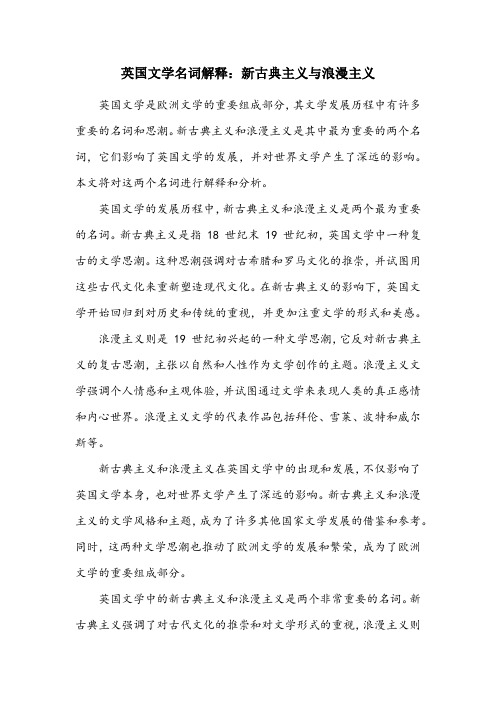
英国文学名词解释:新古典主义与浪漫主义英国文学是欧洲文学的重要组成部分,其文学发展历程中有许多重要的名词和思潮。
新古典主义和浪漫主义是其中最为重要的两个名词,它们影响了英国文学的发展,并对世界文学产生了深远的影响。
本文将对这两个名词进行解释和分析。
英国文学的发展历程中,新古典主义和浪漫主义是两个最为重要的名词。
新古典主义是指 18 世纪末 19 世纪初,英国文学中一种复古的文学思潮。
这种思潮强调对古希腊和罗马文化的推崇,并试图用这些古代文化来重新塑造现代文化。
在新古典主义的影响下,英国文学开始回归到对历史和传统的重视,并更加注重文学的形式和美感。
浪漫主义则是 19 世纪初兴起的一种文学思潮,它反对新古典主义的复古思潮,主张以自然和人性作为文学创作的主题。
浪漫主义文学强调个人情感和主观体验,并试图通过文学来表现人类的真正感情和内心世界。
浪漫主义文学的代表作品包括拜伦、雪莱、波特和威尔斯等。
新古典主义和浪漫主义在英国文学中的出现和发展,不仅影响了英国文学本身,也对世界文学产生了深远的影响。
新古典主义和浪漫主义的文学风格和主题,成为了许多其他国家文学发展的借鉴和参考。
同时,这两种文学思潮也推动了欧洲文学的发展和繁荣,成为了欧洲文学的重要组成部分。
英国文学中的新古典主义和浪漫主义是两个非常重要的名词。
新古典主义强调了对古代文化的推崇和对文学形式的重视,浪漫主义则
强调个人情感和主观体验,并通过文学来表现人类的真正感情和内心世界。
这两种文学思潮不仅影响了英国文学本身,也对世界文学产生了深远的影响。
- 1、下载文档前请自行甄别文档内容的完整性,平台不提供额外的编辑、内容补充、找答案等附加服务。
- 2、"仅部分预览"的文档,不可在线预览部分如存在完整性等问题,可反馈申请退款(可完整预览的文档不适用该条件!)。
- 3、如文档侵犯您的权益,请联系客服反馈,我们会尽快为您处理(人工客服工作时间:9:00-18:30)。
The Old EnglishAlso known as Anglo-Saxon English, mainly used during the period of Anglo-Saxon Conquest. Foundation of English language and literature(Foundation of England in 5th century - the Norman invasion in 1066)The Middle EnglishUsed to describe the language from the Norman Conquest(1066) to about 1500, a period during which London English gradually became the dominant dialect.The larger proportion of Middle English literature is religious. The church had a virtual monopoly(事实上的垄断) on literacy during much of the Middle Ages. Christianity teaching was primarily concerned with the issue of personal salvation. EpicA long verse narrative on a serious subject, told in a formal and elevated style, and centred in a heroic or quasi-divine figure whose actions depend on the fate of a tribe, a nation, or the human race.Romance(a.k.a Chivalric romance / Medieval romance)It is the most prevailing form of literature in the feudal England. A type of narrative that developed in 12th-century France. It represents a courtly and chivalric age, often one of highly developed manners and civility. Love, chivary and religion make the main content of romance.It is a long composition, in verse or in prose. It describes the life and adventures of a noble hero. The central theme is loyalty to king and Lord. The code of manners and morals of a knight is Chivalry. The most important romance is king Arthur and his knights of the Round Table.AlliterationCertain accented words in a line begin with the same consonant sound.KenningA poetic compound made up of two or three nouns standing for another noun. E.g: Beowulf-- bee-wlof-- bearUnderstatementsTo give an impression of reverse and at times a tinge of ironical humour. A characteristic of the English language. E.g: Not troublesome-- welcome; Not praise-- A right to condemnHeroic CoupletA traditional form for English poetry, commonly used for epic and narrative poetry; it refers to poems constrcted from a sequence of rhyming pairs of iambic pentameter lines. iambic pentameter means a line consisting of five iambic feet and one foot comprises of an unstressed syllable followed by a stressed syllable.BalladIt is a poem usually set to music, thus, it often is a story told in a song. Any myth form may be told as a ballad, such as historical accounts or fairy tales in verse form. It usually has foreshortened, alternating four-stress lines("ballad metre") and simple repeating rhymes, often with a refrain. If it is based on a political or religious theme, a ballad may be a hymn.The Elizabethan AgeIt is an age of economic development and cultural prosperity at home, and of expansion and exploration abroad.A period of drama and poetry. The Elizabethan drama is the real mainstream of the English Renaissance.English RenaissanceIt is a cultural and intellectual movement which first flourished in the 14th century in Italy and later spread to France, Spain, the Netherlands, and England in the 15th and 16th centuries. The French word "renaissance" means "rebirth" in English.The central ideal of the Renaissance was humanism. In all, the Renaissance could be viewed as an attempt by intellectuals to study and improve the secular and worldly, both through the revival of ideas from antiquity, and through novel approaches to thought. The invention of the pringting press allowed the rapid transmission of these new ideas. As it spread, its ideas diversified and changed, being adapted to local culture.Renaissance:the activity, spirit, or time of the great revival of art, literature, and learning in Europe beginning in the 14th century and extending to the 17th century, marking the transition from the medieval to the modern world.English dramaSpenserian stanzaBlank verse(无韵体): consists of lines of unrhymed iambic pentameter. Of all English metrical forms it is closest to the natural rhymes of English speech, and at the same time flexible and adaptive to diverse levels of discourse. It becomes the standard metre for Elizabethan and later poetic drama.SonnetEclogueUtopia (no place)A description of an imaginary land, written by Sir Thomas More(1516). It's about the search for the beast possible form of government, and serves as a critique of European social, political, and religious institutions and practices.EssayA piece of writing which is often written from an author's personal point of view. Essays can consist of a number of elements, including: literary criticism, political manifestos, learned arguments, observations of daily life, recollections, and reflections of the author. The definition of an essay is vague, overlapping with those of anarticle and a short story. Almost all modern essays are written in prose, but works in verse have been dubbed essays.ElegyMetaphysical poetsCavalier poetsCarpe diemAllegoryA narrative, in which the characters and actions, and sometimes the setting as well, are contrived to make coherent sense on the literal level of signification, and at the same time to signify a second, correlated order of signification.Paradise LostIt is Milton's masterpiece, an epic poem in blank verse and one of the greatest epic poem in world literature.To justify the ways of God to ManThe EnlightenmentIt refers to the intellectual movement from the 1680s to 1789, which advocated reason as the primary basis of authority. Developing in France, Britain and Germany, its sphere of influence included the whole Europe.Neoclassicism(新古典主义)It dominated English literature from the last decades of the 17th century to the early 18th century. Neoclassicism is the name given to Western movements in the decorative and visual arts, literature, theatre, music, and architecture that draw inspiration from the "classical" art and culture of Ancient Greece or Ancient Rome. The rise of English novelIt was another important phenomenon of the period. With the wide audience from the middle class, the literary tendency of the period was moving away from the conventional romance, stories about the life of aristocratic class, to works of accounts of the common people. The novelists combined the allegorical tradition of the moral fables with the picaresque tradition of the folk stories and achieved a writing of both realistic accounting and moral teaching.Gothic Novel(哥特小说)As a literary genre, it combines elements of both horror and romance. Sentimentalityin poetry and fiction it appeared together withe the rise of the English novel, as a partial reaction against that cold and logic rationalism.SatireIt is a composition in verse or prose, in which human or individual vices, follies, or shortcomings are held up to be censured by means of ridicule, derision, burlesque, irony, or other methods, with an intent to bring about improvement. Simply speaking, satire seeks to expose the moral excesses by means of laughter.Three Dramatic UnitiesRobinson Crusoe。
